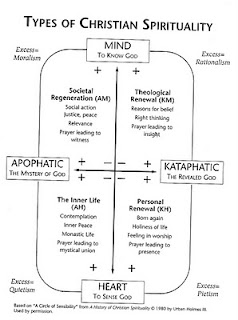Lost Themes of Mission - New Creation...
"There is a remarkable image in the closing pages of Scripture that has become a touchstone for the way my colleagues and I think about faith and culture..." writes Miroslav Volf in an article (The Church's great malfunction).
Amid its descriptions of the New Jerusalem, Revelation includes "the tree of life, bearing 12 crops of fruit, yielding its fruit every month. And the leaves of the tree are for the healing of the nations" (Rev. 22:2). The tree holds out hope that whole cultures will be healed and mended, becoming places where people can flourish. And it sets an agenda for faith as a way of life that contributes to that flourishing, in anticipation, here and now.
Brueggemann (Brueggemann. (2007: 161ff). Hope for the World. Louisville: Westminster)makes sense of the church's purpose to witness to God's intention through making sense of God's purpose of bringing the 'whole creation to well-being'. He points to the simple but effective premise that "Mission is Missio Dei; The action is God's action in mending creation; The hope is God's hope for a new creation". Brueggemann challenges the capacity of the people of God in mission to practice a hope that is rooted solely in God's own hope.
It has taken an unrelenting NT Wright to point out within contemporary theology that the theme of New Creation has routinely been ignored or at best marginalised. It has taken an unrelenting NT Wright to point that this great theme, which brings a framework of meaning and purpose, is present throughout scripture both in poetry and song and rich and dense theology but more significantly embodied by Jesus himself.
Back to Volf who points out that:
Karl Marx famously noted that religion—Christian faith, he primarily meant—is the "opiate of the people," a "downer" or depressant insulating them from reality and consoling them with a dream world of heavenly bliss. Marx missed the point that religion can often be an "upper," a stimulant that energizes people for tasks at hand. But the truth is that when Christian faith functions only as a soothing or performance-enhancing drug, that faith is, in fact, malfunctioning.
'I am a new creation' we used to sing with much gusto and natty guitar chords but now I discover that it represents one of those areas in scripture where the NIV lets its readers down with a bump. TNIV has corrected the error "if anyone is in Christ, the new creation has come" has a very different emphasis to "if anyone is in Christ - he is a new creation". New Creation impacts our understanding of mission and invites the church, rather than malfunction, to take up its responsibility beyond introspection, as a 'counteractor of hope in every dimension of life', in doing so liberating creation from its bondage to decay (Romans 8:21) through showing God's abundance, justice, fruitfulness and God's vision of unity.

Comments
Thanks for the post!
What I find interesting about this is that "the New Creation" was a key theme in Wesley's theology, particularly in his later years. And it wasn't just about an individual new creation, but about the whole of creation being redeemed. In some ways it seems he was ahead of his time. Wesleyans after Wesley (including the Army!) seem to have dropped this strand of his thought, unfortunately, but it is being re-discovered, so to speak. His is another voice to add to the many contemporary theologians who are thinking along these lines.